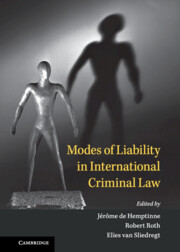Book contents
- Modes of Liability in International Criminal Law
- Modes of Liability in International Criminal Law
- Copyright page
- Contents
- Biographies
- Acknowledgements
- Abbreviations
- 1 Cross-Cutting Issues
- Part I Individual Commission
- Part II Joint Commission
- Part III Participation
- Part IV Participating in Group Activities
- Part V Inchoate and Preparatory Acts
- 11 Attempt
- 12 Planning
- 13 Conspiracy
- 14 Incitement
- Part VI Other Forms of Responsibility
- Part VII Concluding Observations
- Index
- References
11 - Attempt
from Part V - Inchoate and Preparatory Acts
Published online by Cambridge University Press: 01 July 2019
- Modes of Liability in International Criminal Law
- Modes of Liability in International Criminal Law
- Copyright page
- Contents
- Biographies
- Acknowledgements
- Abbreviations
- 1 Cross-Cutting Issues
- Part I Individual Commission
- Part II Joint Commission
- Part III Participation
- Part IV Participating in Group Activities
- Part V Inchoate and Preparatory Acts
- 11 Attempt
- 12 Planning
- 13 Conspiracy
- 14 Incitement
- Part VI Other Forms of Responsibility
- Part VII Concluding Observations
- Index
- References
Summary
Despite recent developments, prosecuting attempts to commit international crimes have typically been rare at the international level. The infrequency of prosecution can be explained by several factors. Some scholars have argued that attempt liability for war crimes, crimes against humanity or genocide might not have met the ‘seriousness requirement’ in order to be brought within the ICTY and the ICTR’s respective jurisdictions or might not ‘have implicated the collective considerations of peace and security that animated the creation of the tribunals in first instance’. Moreover, according to Schabas, prosecuting attempted international crimes was not entirely necessary since international courts and tribunals were generally established ex post facto, that is once such crimes have already been committed.
- Type
- Chapter
- Information
- Modes of Liability in International Criminal Law , pp. 339 - 354Publisher: Cambridge University PressPrint publication year: 2019
References
Select Bibliography
- 1
- Cited by



